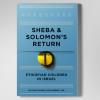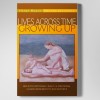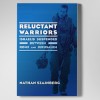My father does not live in America, never did. In 1951, my father arrived in Rochester, NY, home to Kodak, home to Xerox, where he stayed to this very day. He goes nowhere without my mother. Restaurants, dinner parties, not unless they go together, with my mother. Movies, certainly not without her. Concerts, for sure not. Baseball games, never, even with her. To shul, he drives alone.
In 1999, she died. Would he go in California, to visit me in his loneliness? “Not without your mother.” Today, a snow-packed day, my father announces he and I will go to see my mother. We must leave immediately, clean up the grave, prepare for spring planting. In Rochester! In February! In Rochester, in February, the snowdrifts rise to four feet and more. As a kid, walking to school in winter, I always wished they’d top four feet, so school would be cancelled: up to my nose, my brow, topping my head. Now, 45 years later, snows bid my boy-wishes. The Rochester Jewish cemetery is located in Irondequoit, on the banks of Lake Ontario. No Jews alive there; only dead ones are planted, never to grow. Live Jews are south, one hour away. Not one hour drive for him, though; for him, two hours. He drives local roads, not freeways, and slowly. He wants death to be cancelled or at least delayed. No rush to be reminded she’s dead and there.
The texture of the road is rock salt, ice, and grime, a slush tinted with the grayish shades of an industrial town. My father’s old rear-wheel Olds fishtails along the Genesee River. We swim upstream to the cemetery, to death locale, off an unplowed side road, off another side road, and another one, surrounded by tiny, irrelevant houses. Infuriated as he scans a sea of snow swallowing the tombstones, my father declares that no one cares – no one -, to dig a pathway into the cemetery. No one has ever cared for anyone in here. Not even the caretakers, who are nothing but careless-takers. He erupts volcanically. Never tall, stunted in Auschwitz, and now shrunken further by time, but in spite of the size, always been an active Etna, ready to blow. To the doctor of the Intensive Care Unit, where my mother laid in coma, amputated, dialyzed, intubated, respirated, just because the surgeon had suggested it might be the end, “To die?” my father exploded, “Everyone is going to die! You are going to die too, you know! Doctor? A doctor in Auschwitz you are.” Lava spewed.
He parks up a curb to let other cars slither by, gets out, pops the trunk, hands me two snow shovels, yanks a 50-pound bag of sand onto his shoulder, and says nothing. Wrapped in the shadows of pre-war Lodz, muscular and spirited, the 82 year-old man is ready to dig his way to his wife’s grave through a mountain of snow, no matter how far it will be. I see Paul Celan, soil in his eyes, excavating to meet the dead, expiring. I take point position to attack that virgin white snow impeding our visit. I dig and look back surreptitiously with shovel throws over my left shoulder. I see myself rescuing him, resuscitating him in a snowy grave. I too curse, but within. Without, I dig. I feel insignificant compare to the veteran snow digger, the Golden Shovel knight, the miniature Hercules cleaning the Aegean stables. Trained as a machinist, my father follows, correcting my path. He removes patches of snow I throw on the buried lawn and straightens the sides. His eyes plumbing ninety degrees admonish me to make the snow ramparts straighter. As meticulously as with the sheet rock he laid for our living room walls.
We reach the stone. He collapses on it. He embraces it. His face buried in his forearm, his shoulders lurching with sobs. I hear prayers. He turns to my younger sister’s neighboring pink monument, erected 10 years ago, and he weeps forever.
At the end, we did not turn our backs, but backed away with respect for the deceased, as the High Priest in the Temple did when leaving the Holy of Holies on Yom Kippur, lest he was struck dead.
The four-year-old silver Olds is in perfect shape, with 25,861 original miles. Each mile I made, he says triumphantly, is my own. The radio speaks of today, with the same radio voice, disregarding all his wishes. So he reaches from the seat box his “Chazoinem” tape with his favorite old cantors, masters of Yiddish mourning melodies and plaintive poetry. He then breathes, the deepest breath I have heard today, and drives back home. Back to Lodz. For my father does not live in America, never will. He lives in Past, Perpetual, home to memory, wailing at the Present, telling who is dead and what is dead.
He does not live in America, but in a place where Auschwitz will not happen. The Present jolts him awake from his truer dreams. My father wants to sleep.




Wow! A moving story to which my emotions respond at once. My parents have intentionally created for themselves, also, a universe apart, a folie a deux, a cloudcuckoo land walled with financial protections in which to hide out from the gritty realities of the era in which we are now living. I empathise with their desire, inasmuch as the traumas they underwent before constructing their protective cocoon together were irremediably grave and I feel they have every right to have effected their escape – notwithstanding that for a child to grow up with one foot in the parental fairyland and only one out there in the “real” world was, I confess, a profoundly destabilizing and disorienting experience which only decades of processring has resolved into a semblance of congruence. I am looking forward greatly to hearing your shiur at Kol Emeth this pm, which our mutual acquaintance, Dr. Tarnopolsky, has urged me to stay and listen to. I am invariably delighted to see you when you come in with your baby to get yourself a cup of coffee and a scone, sometimes, at Peet’s next to Piazza’s. Interested to see that you have been working in China – among the nations of the world China is one of my first and tenderest loves. And now it’s off to listen to the reading of Shemot! Shabbat shalom, Nathan!